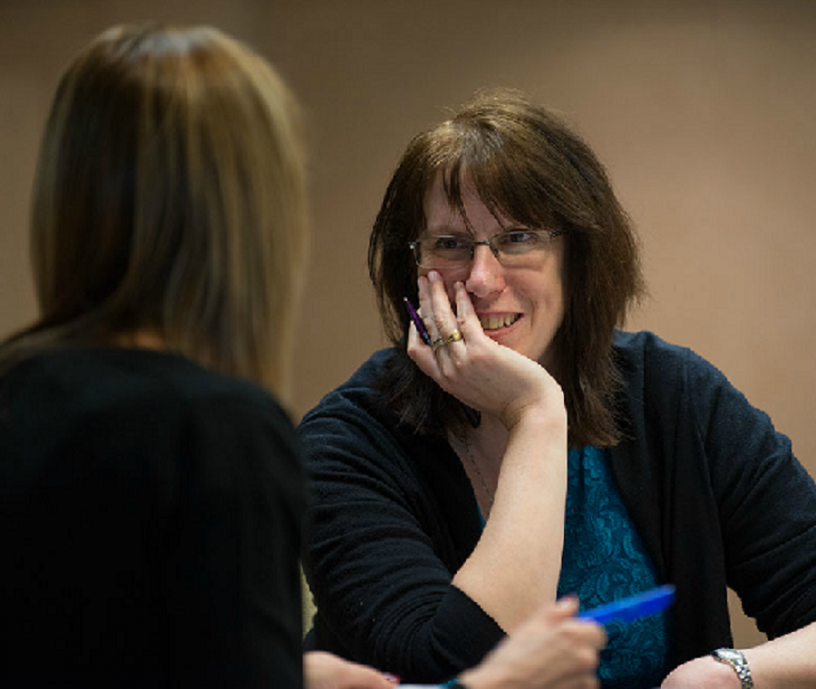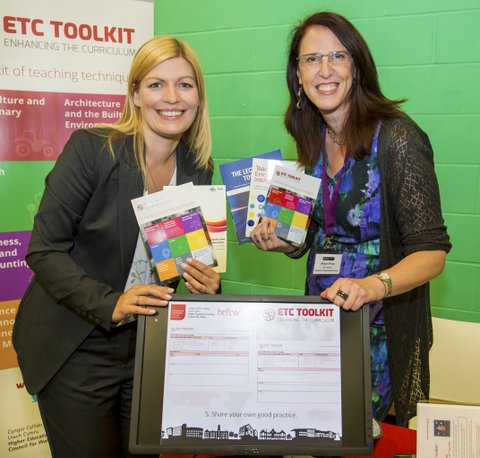IN THE SPOTLIGHT:
Name: Alison Price
Location: Usually to be found on train, on twitter (@AlisonEntEv) or working from home!
Occupation : Enterprise Educator (Principal Consultant, Enterprise Evolution)
You are an influential individual within the enterprise education space. What does ‘enterprise education’ mean to you, and why do you think it’s important?
Enterprise is, at its core, “having an idea and making it happen”. Within an educational environment, this gives students the chance to explore a wide range of new skills from within their subject area (everything from idea generation through to project management) but also, and most critically, learn to appreciate their personal strengths, interests and preferences.
I think it is vitally important to give students the opportunity to try things out – to prototype or problem solve – and this can be at its most powerful when set within their own subject area.
It is so great to have the chance to work with your subject knowledge and personal skills to explore your industry and support developing customer needs. It can really help you find your passion for your subject!
How did you first become involved with enterprise education?
I was attracted to a new role, Enterprise Learning Manager, working with the universities of Leeds, Sheffield and York. I was working in a business school, as Strategic Management and Marketing Lecturer, and saw the opportunity in this new role to support those who wanted to work differently with their students; working beyond core text books and traditional case studies, to create meaningful learning for their students, and help them develop skills and confidence in their learners – helping them to shape their own future.
Enterprise education has been the perfect place for me to work, bringing together my love of learning through relevant and authentic teaching methods, with my passion to help people to develop their skills and see opportunities. Although students are the final focus of my work, it has really been working within staff development that I have seen people flourish and excited about their subject area in a new way!
In an article published at the end of 2016, you remarked that you were “very excited by some of the stronger results that show an increased confidence in those delivering in the classroom to engage with externals and alumni for the benefit of their learners”. But also that “there is still much to do – pockets of excellence can be found across UK universities and colleges but the enterprise experience of our young people is not yet robust.” How can educators help their students to develop an entrepreneurial mind-set?
These remarks came from a stakeholder review of the “Oslo Agenda” – a European policy document issued 10 years ago to help stimulate the development of the entrepreneurial mind-set. It was a small piece of research, designed to reflect on the progress made and showed some interesting results. We are really making progress and teaching staff are much more confident in this area, but we do know that this isn’t widespread and staff aren’t yet making the most of new approaches and technology.
By using a wide range of teaching techniques, not only are staff getting ahead of the TEF and improving their student satisfaction, but also they are exposing their students to new opportunities within their subject discipline.
I believe educators can help students develop their entrepreneurial mind-set by embedding enterprise experiences into their teaching – this can build skills and confidence, as well as develop subject knowledge and expertise. This is the work that I do with teaching staff, developing their approaches, confidence and understanding of the entrepreneurial mind-set so that they embed this into their teaching. Typically this would be a workshop or a residential programme, but I have worked with individual staff, supporting them as a mentor, to explore the changes they want to make.
How has enterprise education changed over the years, and how does it benefit students today?
When I first started, enterprise education seemed relevant only to a very small group who knew that they wanted to start a business. A lot has changed over the last 20 years, however, including graduate career aspirations and expectations, employer and market needs, and also access to customers (with the popularity of eBay, social media, etc.).
The field of enterprise education has, over these 20 years, established a clear contribution to graduate employment and student satisfaction as it connects learners to their subject area through industry and sector experiences.
It has also changed a lot as staff now have more materials, better support and great networks (such as membership organisation @EEUK), as well as exciting new products that can engage students online or in the classroom, allowing them to work in entrepreneurial teams, or even with the input of alumni or externals.
Can enterprise be included at all stages of education, and within every subject? If yes, how? If no, why not?
About 20 years ago, I worked with the LTSN (now Higher Education Academy) to see if we could embed enterprise into all their HE subject areas (even into philosophical and religious studies!). We delivered on that by working with their subject centre leaders, and that inspired me to prove that we could embed enterprise into any subject. In fact, last year – when I worked in China to support an educator to embed enterprise within his curriculum – I added a new subject: the study of Maoism!
I personally believe that the earlier you can begin, the better, which is why I work with staff across the education sector. Saying that, I also believe that it’s never too late to get started.
How do you evaluate and measure the success of enterprise education generally, and your own practices specifically?
I work with staff, so my own measures of success are about their confidence to make curriculum changes and work differently with their students, but I also work with universities to help them measure their own impact.
I also offer staff mentoring to help those working in enterprise positions navigate the complexities of their ever-expanding job roles! This means looking at their ambitions as well as their metrics to help chart institutional progress or to identify the entrepreneurial “learning gain” for their students.
What would you say to any institutions or academics who have still not included enterprise education within their curriculum?
“How can we help you?”, or “What is stopping you?”
First, I would suggest that they connect with someone else; this will help them to see the benefits and the approach first hand, and understand what it means for their subject area. This might mean sitting in on someone else’s workshop or class, or seeing what enterprise activities are already available that they can connect with. It might be as simple as looking in their own institution for a “buddy” or asking EEUK who their contact is and asking for their help. Every September, there is a national conference that is buzzing with ideas and full of colleagues sharing experiences, all delivered in a way that will inspire! If they can’t wait until then, check out ETCToolkit for ideas to change the way they teach (as a free resource where enterprise educators share their approaches with others, curated by EEUK).
You have worked to support enterprise and entrepreneurship for over 20 years and have been a real role model for female entrepreneurs. How much progress has been made – and what still needs to be done to support female entrepreneurs?
The challenge of supporting female entrepreneurs is not one that the education sector has really addressed yet. There are lots of assumptions that everything offered within the education sector is equally available to all students, and yet Professor Tim Dafforn (the Chief Entrepreneurial Adviser at the Department for Business, Energy and Industrial Strategy [BEIS]) declared in September 2016 that, in nine months of studying data for BEIS, he has found that half as many women are taking enterprise education as men. This tells us something important about making these assumptions and it is our challenge to help balance these numbers. As with all areas of under-representation within business start-ups, it is a huge loss – if any group doesn’t know about opportunities that are available to them, or if our economy is not representing our population, we – as a nation – are really missing out. Under-represented groups within business are effectively under-utilised assets and resources in our UK economy – so we need to help mobilise these groups!
Where do you hope to see enterprise education in five years’ time?
I hope that the interest and excitement in this (still relatively) new area continues and that we see educators displaying passion, and taking considered risks, for the benefit of our students and learners.
I hope that the government continues to make a clear statement of support towards enterprise education – as their support alone can ensure that senior managers in colleges and universities recognise this is an important area within all levels of education.
I hope that educators address the tricky issue of assessment – I still feel that this is a weakness for our subject and one that is best addressed by looking at the outcomes we want for our learners within each discipline/programme.
And I hope that we start seeing the evidence of the impact of our pioneering approaches, creating new entrepreneurs, confident graduates and excellent employees in our economy. Our story is just beginning, so we will have lots to share in 5 years!
And finally, Alison, tell us: if you were an animal, what would you be and why?
That’s a difficult question. I was born in the Chinese Year of the Dog – faithful, loyal and honest – but then I guess that means I am a pack animal, which might explain why I love travelling around and working with groups!







Leave a Reply